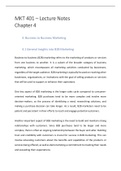MKT 401 – Lecture Notes
Chapter 4
4. Business to Business Marketing
4.1 General Insights into B2B Marketing
Business-to-business (B2B) marketing refers to the marketing of products or services
from one business to another. It is a subset of the broader category of business
marketing, which encompasses all marketing activities conducted by businesses,
regardless of the target audience. B2B marketing is typically focused on reaching other
businesses, organizations, or institutions with the goal of selling products or services
that will be used to support or enhance their operations.
One key aspect of B2B marketing is the longer sales cycle compared to consumer-
oriented marketing. B2B purchases tend to be more complex and involve more
decision-makers, so the process of identifying a need, researching solutions, and
making a purchase decision can take longer. As a result, B2B marketers need to be
patient and persistent in their efforts to reach and engage potential customers.
Another important aspect of B2B marketing is the need to build and maintain strong
relationships with customers. Since B2B purchases tend to be larger and more
complex, there is often an ongoing relationship between the buyer and seller. Building
trust and credibility with customers is crucial for success in B2B marketing. This can
involve educating customers about the benefits and capabilities of the products or
services being offered, as well as demonstrating a commitment to meeting their needs
and exceeding their expectations.
, Effective B2B marketing also requires a deep understanding of the target audience.
This includes understanding the needs, challenges, and goals of the businesses or
organizations being targeted, as well as the decision-making process and key players
within those organizations. Market research and customer segmentation can be
helpful in this regard, as they allow marketers to identify key customer groups and
tailor their messaging and strategies accordingly.
In terms of marketing tactics, B2B marketers often use a mix of traditional and digital
channels to reach and engage their target audience. This can include print and online
advertising, direct mail, trade shows and events, social media, email marketing, and
content marketing. In addition to these channels, many B2B marketers also rely on
inbound marketing tactics such as search engine optimization (SEO), pay-per-click
(PPC) advertising, and lead generation through website forms and landing pages.
Another important element of B2B marketing is the use of sales enablement tools and
strategies. Sales enablement refers to the use of technology, processes, and content
to improve the efficiency and effectiveness of the sales process. This can include
providing sales teams with the information, resources, and support they need to
effectively communicate the value of the products or services being offered, as well
as to close deals and maintain customer relationships.
B2B marketing also requires a focus on lead generation and nurturing. This involves
identifying and targeting potential customers, and then working to build relationships
with them through a variety of tactics, such as email campaigns, webinars, and content
marketing. As potential customers progress through the sales funnel, marketers can
use lead nurturing tactics to keep them engaged and move them closer to making a
purchase decision.





